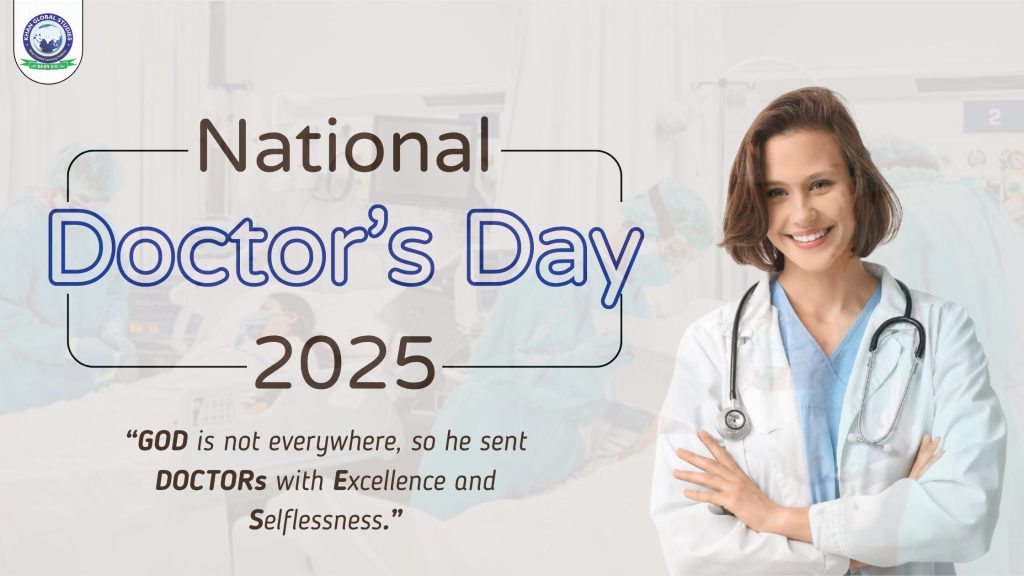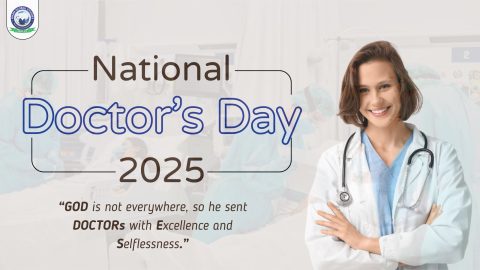Every year, National Doctors Day is observed to recognize the immense contributions of doctors who dedicate their lives to the service of others. These medical professionals work tirelessly—often behind the scenes—to protect, heal, and guide patients through some of the most vulnerable moments of their lives. In India, this significant day is celebrated on July 1st, commemorating the birth anniversary of Dr. Bidhan Chandra Roy, one of India’s most respected physicians and a visionary in healthcare.
Why National Doctors Day 2025 Matters More Than Ever?
The global healthcare landscape has evolved drastically, but one thing remains unchanged: the essential role of doctors. Their duties extend far beyond hospitals and clinics—they influence policy, improve community health, conduct vital research, and provide leadership in times of medical crisis. National Doctors Day reminds us to pause and reflect on the sacrifices and courage it takes to wear a white coat and serve others.
Honouring Dr. Bidhan Chandra Roy: The Inspiration Behind the Day
July 1st is not just a calendar date; it marks the birth and death anniversary of Dr. B.C. Roy, a physician whose legacy transformed Indian healthcare. Serving as the second Chief Minister of West Bengal, he merged medical expertise with political leadership, founding institutions like Chittaranjan Cancer Hospital and the Indian Medical Association. His pioneering vision earned him the Bharat Ratna, India’s highest civilian award.
In 1991, the Government of India declared July 1st as National Doctors Day to recognize the relentless service, integrity, and expertise of doctors across the nation.
The Multifaceted Roles Doctors Perform Daily
Doctors are not just healers; they are counselors, educators, mentors, researchers, and often, emotional anchors. Here’s an in-depth look at the vital roles they assume:
1. Accurate Diagnosis and Patient-Centred Treatment
Doctors begin their journey with every patient by collecting detailed histories, analyzing symptoms, and conducting medical investigations. Whether it’s a routine fever or a rare disease, an accurate diagnosis is critical. They tailor treatment plans based on patient needs, ensuring a personalized, evidence-based approach to care.
2. Preventive Healthcare and Lifestyle Guidance
Prevention is the foundation of public health. Doctors advise on:
- Vaccination schedules
- Dietary modifications
- Physical activity routines
- Regular screenings for early disease detection
Through these interventions, they help minimize long-term health risks and promote a healthier population.
3. Emotional and Mental Health Support
Healing extends beyond prescriptions. Doctors often provide psychological support during illness, bad news, chronic pain, or loss. They help patients navigate fear, grief, anxiety, and confusion, often forming deep bonds built on trust.
4. Community Health and Education
Doctors actively engage in public health campaigns, school awareness drives, and mass outreach programs. From promoting tobacco cessation to educating about infectious disease prevention, they empower communities with the knowledge needed to make healthier choices.
5. Specializations and Emergency Response
Many doctors specialize in fields like cardiology, neurology, oncology, or surgery, offering expert care. Others serve on the frontlines in ICUs, emergency rooms, or rural outposts, often risking their own well-being to save lives.
Behind the White Coat: Hidden Challenges Doctors Face
Though admired, the path of a doctor is often lined with stress, sacrifice, and high expectations. Here’s what most people don’t see:
- Gruelling Schedules and Burnout: Doctors frequently work long hours, including night shifts, weekends, and holidays. Surgeons and ER doctors may go 36–48 hours without proper rest. This constant demand can lead to burnout, fatigue, and even depression.
- High-Stakes Pressure: Every decision a doctor makes carries weight—one error could mean life or death. Constant vigilance, especially in critical care, brings immense psychological pressure that few professions experience.
- Emotional Trauma and Compassion Fatigue: Witnessing suffering, delivering bad news, and experiencing patient loss takes an emotional toll. Over time, some doctors develop compassion fatigue, which can affect mental well-being and job satisfaction.
- Keeping Pace with Medical Advances: Modern medicine is dynamic. Doctors must constantly study new treatments, attend workshops, and understand emerging diseases. Staying relevant requires lifelong learning and adaptability.
- Administrative Burdens: In addition to patient care, doctors must manage:
- Electronic medical records
- Compliance documentation
- Insurance paperwork
- Hospital protocols
These non-clinical tasks often consume hours of their day, reducing time spent on direct patient interaction.
Simple Yet Powerful Ways to Appreciate Doctors on National Doctors Day
Expressing gratitude doesn’t need to be elaborate. Thoughtful gestures can uplift and energize these healthcare warriors.
- Say “Thank You” with Intention: A few genuine words of thanks after an appointment or procedure mean more than most realize. Acknowledging their effort, especially during busy hours, boosts morale.
- Write a Personalized Message: Consider sending a handwritten note, card, or email. Highlight how a specific doctor helped your family or made you feel safe—it’s a meaningful way to honour their impact.
- Leave a Positive Online Review: A well-written testimonial on a hospital website or healthcare platform validates a doctor’s work and helps others seeking trustworthy professionals.
- Respect Their Guidance: Following medical advice shows that you trust their expertise. Arriving on time, completing treatments, and showing courtesy reflect mutual respect.
- Share on Social Media: Use platforms like Instagram, Twitter, or LinkedIn to post tributes, stories, or educational content. Tag hospitals or clinics to spread awareness and amplify appreciation.
Hospitals and Institutions to Support on National Doctors Day 2025
Several healthcare organizations and hospitals host blood donation drives, medical camps, health check-ups, and appreciation events on National Doctors Day. Participating in these events shows solidarity with the medical community. Consider supporting:
- AIIMS
- Apollo Hospitals
- Max Healthcare
- Fortis Hospitals
- Tata Memorial Centre
Volunteering or donating to these institutions also aids in continuing their lifesaving missions.
National Doctors Day 2025: Key Themes and Celebrations
Each year, the Indian Medical Association (IMA) selects a theme for National Doctors Day. The 2025 theme is expected to focus on “Healing with Humanity,” emphasizing empathy, ethics, and the human touch in medicine. Institutions will host:
- Award ceremonies
- Panel discussions
- Medical seminars
- Public outreach campaigns
Citizens are encouraged to participate online and offline to foster better patient-doctor relationships.
Final Thoughts
Doctors hold a sacred space in society. They protect life, restore health, and offer hope when we need it most. As we celebrate National Doctors Day 2025, let’s recognize not only their skill but also their sacrifice. Whether you’ve recovered from an illness, found comfort in their words, or simply trust them with your family’s health, take a moment to honour the doctor who made that possible.
Let this day be a call to not only thank doctors but also support policies, institutions, and initiatives that prioritize their well-being, education, and professional growth.





